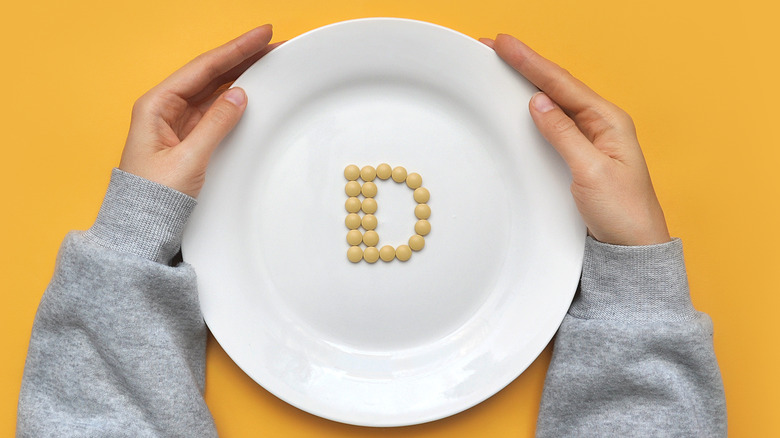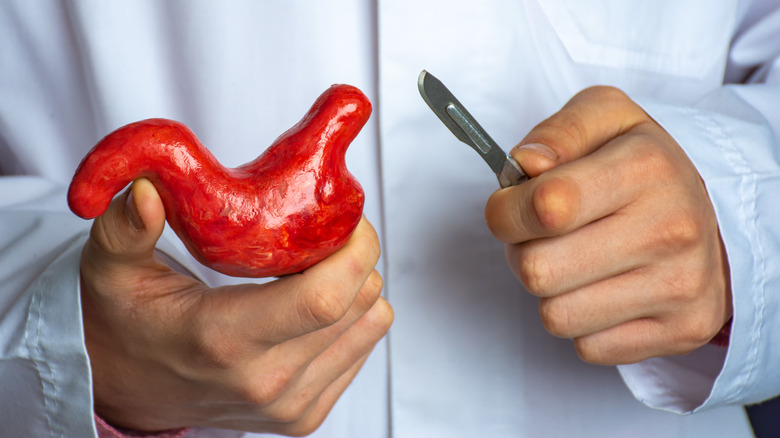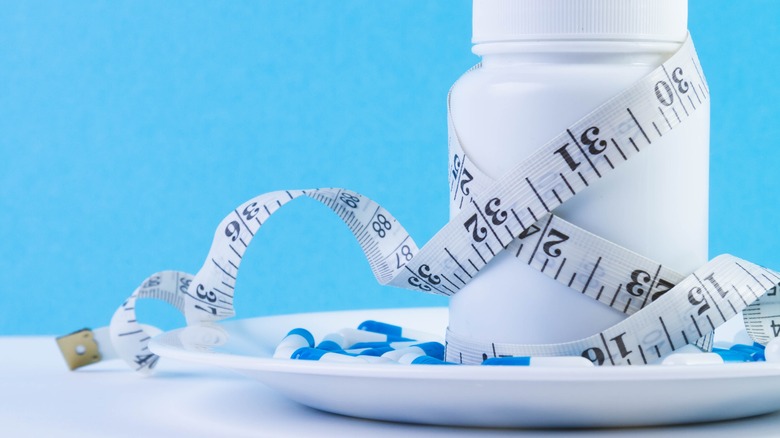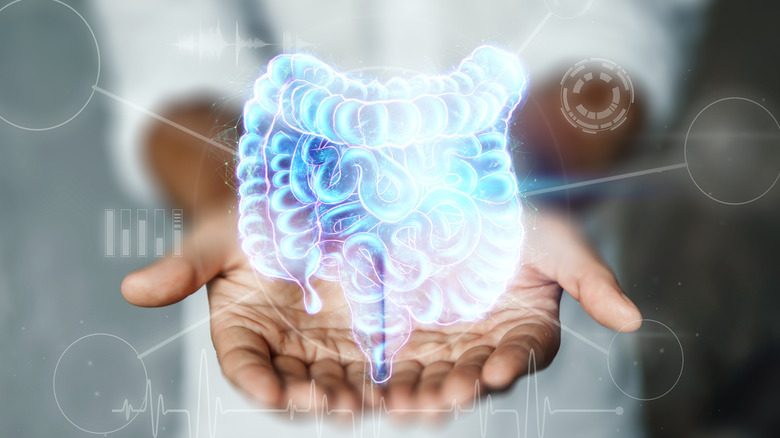13 Unexpected Causes Of Vitamin D Deficiency
Vitamin D is a hormone that you can get either through foods, supplementation, or sun exposure (which is why it is also called the sunshine vitamin), per the National Library of Medicine (NLM). Natural food sources of vitamin D include oily fish like salmon, tuna, and mackerel. Some mushrooms may also provide the vitamin if exposed to sunlight or UV rays during production, per a 2018 review in Nutrients. Additionally, milk, milk substitutes, orange juice, and certain breads and breakfast cereals are often fortified with the vitamin, meaning it is added during processing to enhance their nutritional value. Since vitamin D is only available in a few foods, supplements also make an important oral source (per the NLM).
Initially, researchers thought that vitamin D was only involved in bone metabolism. However, we now know that it is also a key nutrient for bone, nerve, muscle, and immune health, per the National Institutes of Health (NIH). It helps with calcium absorption, which bones need to grow strong and steady. Your nerves need vitamin D to help carry electrical messages between your brain and body. It also helps with muscle strength and contraction. Moreover, your immune system needs vitamin D to fight off harmful microorganisms. Research also suggests that it plays a role in reducing inflammation, improving gut health, and managing blood sugar levels.
Vitamin D deficiency has been linked to bone and brain diseases and metabolic and immune disorders, per a study in the Journal of Osteopathic Medicine. Here are some unexpected causes of vitamin D deficiency.
Getting limited sun exposure
Vitamin D can be produced by your skin through sun exposure. The National Library of Medicine (NLM) explains that ultraviolet B (UVB) radiation from the sun converts a compound naturally present in your skin (7-dehydrocholesterol) to previtamin D, which is then transformed into vitamin D. Therefore, limited sun exposure can lead to vitamin D deficiency.
The NLM states that less UVB radiation reaches your skin during winter, as sun rays hit the earth at a different angle and the ozone layer absorbs most of the radiation. Something similar happens in the Northern Hemisphere, namely in places located at a latitude greater than 37 degrees from the equator (e.g., European countries, Russia, and Canada). In the U.S., the 37th parallel divides the country in half, leaving the states of Virginia, Kentucky, Missouri, Kansas, Colorado, Utah, part of Nevada and California, and the northern states with limited UVB exposure. Furthermore, vitamin D levels may vary throughout the year in countries with four climatic seasons. A study in the Scientific World Journal determined that in England, vitamin D levels peaked in September, and were lowest in February.
Meanwhile, a 2022 study in BMJ Nutrition, Prevention & Health determined that people who have long-term indoor activities tend to have vitamin D deficiency. This includes people who work indoors during the day, as well as those working night shifts. Lastly, according to the National Institute of Health and Care Excellence (NICE), people who cover their skin for cultural reasons have a higher risk of vitamin D deficiency.
Wearing too much sunscreen
Since sunscreen helps reduce UV radiation from the sun (a.k.a, they help prevent sunburn), researchers propose that sunscreen use can lead to vitamin D deficiency by reducing the vitamin's skin production. However, evidence seems to be mixed. According to a 2017 study published in the Scientific World Journal, sunscreen with a protection factor (SPF) of only 30 can absorb up to 98% of UV rays, leading to a 95 to 98% reduction in vitamin D production.
Interestingly, one 2019 review published in The British Journal of Dermatology found contradictory results. According to the review, sunscreen use is likely to cause minimal impact on vitamin D levels. On the one hand, the authors believe this to be due to poor sunscreen application, meaning that it doesn't protect from UV rays the way it should. On the other hand, the review states that the amount of sunlight your body needs to produce vitamin D is low. Thus, typical sunscreen use shouldn't lead to vitamin D deficiency if applied correctly in healthy people. Even so, the review points out that using high-SPF sunscreens together with protective clothing and shade‐seeking behaviors can increase the risk of vitamin D deficiency.
Getting older
Getting older comes with a lot of bodily changes. For example, your arteries become stiffer, your bones become more brittle, and your skin loses elasticity. These changes, while expected, can increase the risk of high blood pressure, bone fracture, and wrinkling, respectively (via the Mayo Clinic). Unfortunately, vitamin D deficiency is another expected change considered a normal part of getting older, which is linked to reduced skin production. In fact, per a study published in the journal Mayo Clinic Proceedings, older adults produce up to 75% less vitamin D than young adults, even if regularly exposed to sunlight.
Moreover, another study published in the Avicenna Journal of Medicine points out that the risk might be higher in older men compared to older women. Per the study's results, 44% of men had severe vitamin D deficiency, compared to 26% of women. According to the study, there are two main reasons behind vitamin D deficiency in older people. First, there's the expected reduction in outdoor physical activities and overall sun exposure in this population. Second, older adults are more likely to have impaired kidney function, and the kidneys are a vital step in the vitamin D activation process.
Having dark skin
According to the Mayo Clinic, your skin is made up of multiple layers, starting with the epidermis or the outer layer, then the dermis or middle layer, and finally, the subcutaneous tissue or inner layer. Your epidermis houses a group of cells called melanocytes which are in charge of producing melanin, the natural pigment responsible for the color of your skin.
Yet, melanin does a lot more than just determine your skin color. According to Healthline, melanin can also protect you against UV radiation from the sun, meaning that it sort of acts as a built-in sunscreen (although this doesn't mean that you should ditch your SPF!).
Due to melanin's effect on UV radiation, people with higher melanin levels have an increased risk of vitamin D deficiency. Per a 2018 study published in the journal Cureus, increased melanin levels absorb and scatter UV rays from the sun, leading to a reduced production of vitamin D from the skin. In other words, people with darker skin tones have a harder time producing their own vitamin D and need longer UV rays exposure to produce it. In fact, when the study looked upon its vitamin D-deficient population, it found that 39% were of non-Hispanic African-American descent. In contrast, non-Hispanic white participants accounted for only 19% of the vitamin D-deficient population.
Obesity
Obesity is a chronic disease that involves a number of factors or causes, including genetics, illnesses, and medications, as well as eating, exercise, and sleep patterns (per the Centers for Disease Control and Prevention (CDC)). In addition, it increases the risk of type 2 diabetes, heart disease, and cancer. Research suggests that it may also increase the risk of vitamin D deficiency. While low sun exposure and low intake of vitamin D-rich foods are common causes of deficiency, evidence links vitamin D deficiency in people with obesity to two specific potential reasons.
A study published in the journal Obesity explains a concept called volumetric dilution. Per the study, the higher the body weight and body fat, the lower the vitamin D levels, an association resulting from vitamin D's need to be distributed to a larger volume of bodily tissues. On the other hand, a study published in Nutrients states that there's a reduced availability of vitamin D due to its sequestration into adipose tissue. Vitamin D sequestration means that, since vitamin D is a fat-soluble nutrient — meaning that it needs fat to be absorbed — it becomes tightly bound to body fat once it enters the body. Thus, your body cannot access it. Per the study, this happens regardless of the vitamin being consumed through foods or produced in the skin. However, the study says that body fat reduction through weight loss can lead to vitamin D being released into the bloodstream, which would help reverse the deficiency.
Having weight loss surgery
Weight loss surgeries — also known as bariatric surgeries — are a group of procedures that change the anatomy of your digestive tract to promote weight loss (via the National Institute of Diabetes and Digestive and Kidney Diseases (NIDDK)). Some surgeries do so by reducing the size of your stomach, which limits the amount of food you can eat. In contrast, others change the small intestine, which limits the number of calories and nutrients you can absorb, the NIDDK says.
However, while weight loss surgeries are believed to be the most effective treatment for extreme obesity, they're also known for causing nutrient deficiencies, according to a study published in Nutrients. The study explains that while the risk of nutritional deficiencies varies from one surgery to another, common post-surgical causes of vitamin D deficiency include the reduction in food intake, low sun exposure, and the fact that the lack of vitamin D intake or production usually adds up to the pre-surgical deficiency characteristic of people with obesity.
Furthermore, per another study published in Experimental Biology and Medicine, other postoperative complications such as bacterial overgrowth, vomiting, and food intolerance can also lead to vitamin D deficiency. Lastly, some weight loss surgeries can also lead to bile salt deficiency. Since bile salts are needed to digest fats (via Healthline) and vitamin D needs fats to be absorbed, this fat malabsorption increases the risk of deficiency.
Taking steroid medicine
Steroids or corticosteroids are anti-inflammatory medications used to treat numerous conditions, including arthritis, asthma, lupus, and multiple sclerosis (MS), via the NHS. They work by mimicking steroid hormones (which are naturally present in your body) and thus help reduce inflammation and calm the immune system when it mistakenly attacks the body instead of attacking external agents (which happens with autoimmune conditions).
Nevertheless, steroids are known to cause vitamin D deficiency, and people on steroid medication have twice the risk of having a severe deficiency compared to the general population (via Science Daily). According to a study published in The Journal of Clinical Endocrinology and Metabolism, steroids may boost the effect of an enzyme that hinders vitamin D's activity in the body, and they seem to have a more significant impact in children compared to adults. In addition, researchers state that aside from the direct effect of steroids on vitamin D status, people under steroid medication take them to treat underlying conditions that already increase the risk of deficiency, meaning that there seems to be an additive effect.
Low-fat diets
According to the National Library of Medicine (NLM), a low-fat diet is defined as one where fats provide 30% or less of the total calorie intake. This type of diet is often recommended as a way to reduce the risk of heart disease, given the direct association between high saturated fat intakes and high blood cholesterol levels.
However, evidence on the beneficial effects of this type of diet still seems to be mixed (per the Harvard T.H. Chan School of Public Health). Vitamin D belongs to the group of fat-soluble vitamins, along with vitamins A, E, and K. This means that, unlike water-soluble vitamins which dissolve in water, they need fats for your body to absorb them (via Healthline). Therefore, following a low-fat diet for a prolonged time may increase your risk of fat-soluble vitamin deficiency, including vitamin D.
What's more, according to a study published in The Journal of the Academy of Nutrition and Dietetics, even if you take vitamin D supplements while on a low-fat diet, taking your supplements with a fat-containing meal may boost the vitamin's absorption by 32%. Thus, be sure to add some healthy fats such as olive oil, avocados, or nuts to your menu.
Kidney and liver disease
Whether you consume vitamin D orally or your skin produces it, that first version of the vitamin is considered biologically inert, meaning that it has no effect on your body until it becomes activated. Vitamin D activation is a two-step process, the first one happening in your liver and the second in your kidneys, per the National Institutes of Health (NIH). Therefore, people with kidney and liver disease have an increased risk of vitamin D deficiency.
According to a study published in the World Journal of Hepatology, vitamin D deficiency is practically universal in people with chronic liver disease (CLD), with up to 93% of them having low vitamin levels — and some even considered as showing severe deficiency. Per the study, the deficiency might be caused due to a number of reasons, including reduced vitamin activation, insufficient sun exposure, jaundice-related decline of vitamin production on the skin, steroid use, and reduced vitamin D absorption from foods. Similarly, as stated by a study published in the Mayo Clinic Proceedings, people with chronic kidney disease (CKD) have an impaired function of the enzyme in charge of completing the activation of vitamin D, which also leads to lower vitamin D levels.
Taking weight-loss and cholesterol-lowering drugs
According to a 2021 study published in the journal Metabolites, weight-loss drugs' main goal is to reduce dietary fats' absorption. In contrast, cholesterol-lowering drugs (such as statins) act by limiting your body's cholesterol production — which your body also needs to produce vitamin D. Since vitamin D is a fat-soluble vitamin, this means that these types of medications might promote vitamin D deficiency by creating a nutrient malabsorption or through a vitamin-drug interaction.
For example, taking the weight-loss drug Orlistat at the suggested dosage of 120 milligrams three times a day creates a 30% reduction in fat absorption, which also reduces vitamin D's absorption (via Drugs.com). Similarly, per a review published in the journal Risk Management and Healthcare Policy, taking laxatives (another common weight-loss practice) increases the risk of vitamin D deficiency by accelerating the passage of foods through the digestive tract, which doesn't give your body enough time to absorb nutrients — especially fat-soluble vitamins. Furthermore, a group of cholesterol-lowering drugs called bile acid sequestrants (which target bile acids to prevent cholesterol reabsorption) can also bind to dietary vitamin D, leading to its excretion instead of absorption.
Vegan and ovo-vegetarian diets
Vitamin D is naturally present in animal-based foods, including trout, salmon, sardines, tuna, eggs, and liver (per the National Institutes of Health (NIH)). It is also added to commonly consumed foods such as orange juice, breakfast cereals, and milk to increase vitamin D intake and prevent deficiencies. What's more, according to a review published in Nutrients, while vitamin D fortification of milk products in the U.S. is not mandatory at the federal level, most states require fortification.
However, per the NIH, people following dietary patterns low in animal meats and dairy products have a higher risk of vitamin D deficiency. In fact, the review points out that the non-consumption of fortified milk is an independent risk factor for vitamin D deficiency. This specifically raises the risk of deficiency in vegans and ovo-vegetarians — people who follow a type of vegetarian diet that allows the intake of eggs aside from plant-based foods, but (unlike lacto-vegetarian and lacto-ovo-vegetarian diets) excludes the intake of dairy and dairy products (via Healthline).
While certain mushrooms are also natural vitamin D sources, according to a 2018 review published in Nutrients, they might not be enough to cover the vitamin D needs of vegans and ovo-vegetarians on their own. Thus, vitamin D supplements are often recommended.
Inflammatory bowel diseases
Inflammatory bowel diseases (IBD) are chronic inflammatory disorders that affect the gastrointestinal tract. The two main forms of IBD are Crohn's disease and ulcerative colitis, which are characterized by symptoms such as diarrhea, abdominal pain, bloody stools, cramping, weight loss, and fatigue (via Healthline).
Because IBD affects your digestive system, evidence suggests that people with IBD have a higher risk of nutritional deficiencies. In fact, per a 2019 study published in Nutrients, vitamin D deficiency is very common in people with IBD, and it tends to be worse in people with Crohn's disease than ulcerative colitis. Nevertheless, due to vitamin D's role in gut health and immunity, researchers are still unsure whether the deficiency is a cause or a consequence of the disease. According to the study, some of the reasons why people with IBD tend to have low vitamin D levels include having a limited food intake, an impaired nutrient and bile salt absorption — which is needed for fat digestion and vitamin D absorption — and low sun exposure, which medical professionals advise while taking drugs that suppress the immune system. Thus, evidence suggests that people with IBD may benefit from taking vitamin D supplements.
Smoking
It is not news to anyone that smoking is harmful to your health. According to the Centers for Disease Control and Prevention (CDC), smoking can wreak havoc on almost every organ in your body, and both smokers and second-hand smokers (including children) have an increased risk of death and chronic diseases. Moreover, smoking has also been recognized as a risk factor for vitamin deficiencies.
Per a 2018 study published in the journal Cureus, evidence has recently found a link between smoking and low vitamin D levels, which is believed to be caused by a reduced expression of the gene that activates vitamin D in smokers. The results from this study are very similar to those from a previous study published in the Journal of Allergy and Clinical Immunology, which determined that exposure to cigarette smoke was associated with lower vitamin D levels due to an impaired conversion from its inactive to its active state. For smokers who are considering quitting, this is certainly a very good reason to stop smoking for good.













